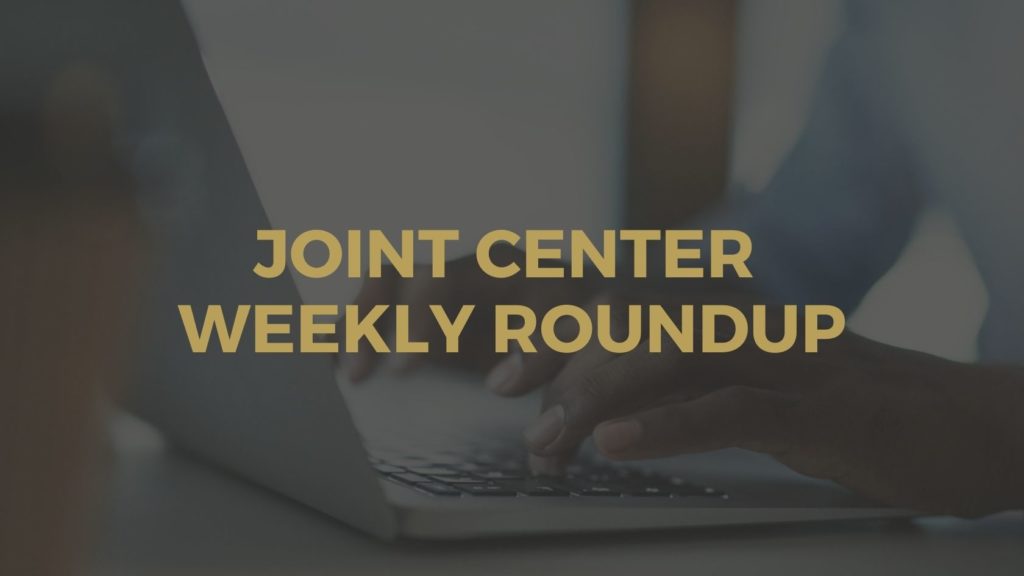COVID-19

A Significant Black Confirmation, Infrastructure Bill Passed in the Senate & More: Aug. 11 Joint Center Roundup
The Joint Center team will be releasing an abbreviated roundup this week and next. We will resume our more robust roundup in two weeks.
Biden Administration

Eunice C. Lee confirmed to the U.S. Court of Appeals for the Second Circuit: Ms. Lee will become “the only former federal public defender among the bench’s 10 active judges,” reports Reuters. The Senate confirmed Ms. Lee by a 50-47 vote. She is the second Black woman to sit on the Second Circuit. Ms. Lee previously served as an assistant defender at Federal Defenders of New York Inc., and as a staff attorney and later a supervising attorney for the Office of the Appellate Defender in New York City.
Biden appoints more Black women to U.S. Appeals Court than any other U.S. President: President Biden surpasses former President Bill Clinton in successfully appointing Black women to the U.S. Court of Appeals after the Senate confirmed Biden’s judicial nominee Eunice C. Lee (above) to serve in the U.S. Court of Appeals for the Federal Court. Prior to Ms. Lee’s appointment, HuffPost reported that President Clinton appointed three Black women, President Barack Obama and President George W. Bush both appointed two, President Jimmy Carter appointed one, and President Donald Trump appointed zero.
In February, the Joint Center urged President Biden to prioritize Black appointments to the U.S. Court of Appeals, as none of President Trump’s 54 appellate court nominations were Black, and 10 of the 18 active Black U.S. Appellate Court judges were eligible to retire. The Joint Center commends President Biden and hopes to see more Black Americans nominated and confirmed to the U.S. Court of Appeals.
Secretary Marcia Fudge confirms support for new federal eviction ban: U.S. Department of Housing and Urban Development Secretary Marcia Fudge and White House correspondent for the PBS NewsHour Yamiche Alcindor discuss President Biden’s new federal eviction ban. Secretary Fudge expresses support for the decision and timeframe of the new eviction moratorium, noting the White House “acted with the kind of reason and just good consciousness of what was going on in the country.” When asked about plans to address the widening gap in homeownership and generational wealth for Black communities that has “deepened in the pandemic,” she highlighted efforts to use an equity lens and to assist FHA mortgage holders. Secretary Fudge reiterates, “people of color, Black people, brown people of low-income people have been living with this for a very, very long time.”
Build Back Better prioritizes affordable health care: As part of the Build Back Better Agenda, the Biden-Harris administration promised to ensure “every American has access to quality, affordable health care and the peace of mind that health insurance brings.” This agenda would extend the enhanced tax credits that lower premiums, add dental, vision, and hearing services to Medicare, negotiate prices Medicare pays for prescription drugs, and “close the Medicaid gap by providing federally-administered coverage for people in states that refuse to expand.”
The Hill

Bipartisan infrastructure bill moves forward: In a 69-30 vote, the Senate passes an approximately $1 trillion bipartisan infrastructure bill. The bill includes $550 billion in new spending over five years, and will head to the House floor next. (Summary here)
The infrastructure bill includes provisions to expand broadband, including a $65 billion investment in broadband infrastructure, provisions to end digital redlining, and a “permanent program to help more low-income households access the internet.” These investments are consistent with recommendations highlighted by Joint Center Tech Policy Director Dr. Dominique Harrison in a Joint Center panel discussion with U.S. Majority Whip James Clyburn (D-SC) and in an issue brief on expanding broadband in the Black Rural South. The bill also includes investments in clean energy transmission, public transit, highway safety, clean water and waste water infrastructure, and $1 billion to fund “planning, design, demolition, and reconstruction of street grids, parks, and other infrastructure” in neighborhoods disrupted by interstate highways.
Senate passes $3.5 trillion budget plan: The $3.5 trillion budget framework passes the Senate with a 50-49 vote. The resolution will allow Democrats to “pass much of President Joe Biden’s economic legislative agenda without Republican support.” Investments identified in the resolution include funding to support HBCUs, expand Medicare, boost federal safety net programs, increase the maximum Pell Grant award, extend the Child Tax Credit and Earned Income Tax Credit, and improve racial health equity, and more. (Summary here) The measure now moves to the House who will cut their recess short and return to session the week of August 23 to “consider a budget resolution to kick off the process for Democrats’ $3.5 trillion spending plan.”
Movement Building
Black Voters Matter uplifts their partner Bull City Votes in North Carolina for their COVID-19 vaccine drive at the St. Ambrose Episcopal Church. The drive provided vaccinations and free food, and educated the community on the fight against SB 473 (summary here).
Color of Change issues a petition to demand state governors to stop anti-protest laws from passing.

National Urban League announces their 2021 virtual conference that brings together racial justice advocates, policymakers, and business and thought leaders to explore issues that affect communities served by the National Urban League and its network of affiliates.
SisterReach hosts a Facebook group for masculine of center (MOC) women, gender non-conforming people, and transgender men to discuss mental health, building positive relationships, reproductive and sexual health, and other topics pertinent to the MOC community.
Events
Upcoming events include “Building a Data-Driven Campaign” (Black Futures Lab, August 13); “Following the Ancestors’ Footsteps into the Future” (Institute of the Black World, August 17); “The future of early childhood education after COVID-19” (Brookings Institution, August 17); “Stronger Nation: Progress Toward a More Talented and Equitable Nation”(Lumina Foundation, August 17); “Promoting Racial Equity in Student Mental Health: Considerations and Strategies for Returning to In-Person Instruction” (The Steve Fund, August 19).
Last week, events were held byAARP and the Federal Reserve Bank of Atlanta, Knight Foundation, and the Urban Institute.
Podcasts
Investing in people and closing the skills gap in a changed economy (WorkingNation)
A New Pathway for Working Adults? (Inside HigherEd)

